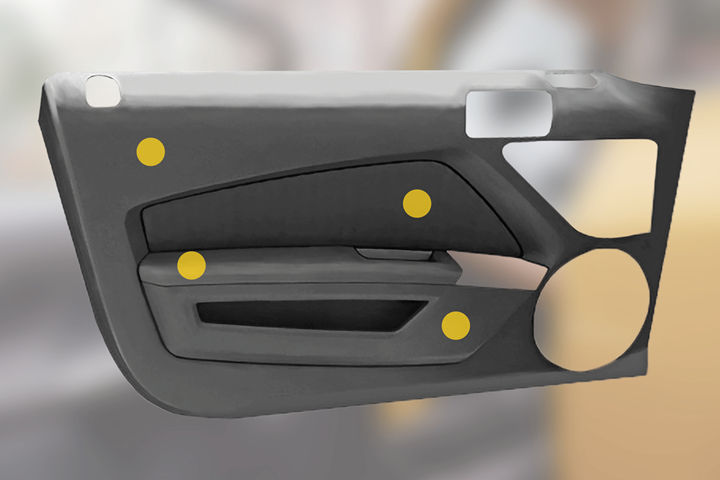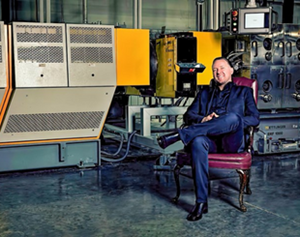Scratch-Resistant PP for Complex Interior Automotive Applications
Compounder Polykemi and subsidiary Rondo Plast launch first of new PP-based compound and sustainable variants that boast both high scratch resistance and UV stability.
A new family of scratch resistant PP compounds focused on complex interior automotive applications has been developed by Sweden’s specialty compounder Polykemi AB (U.S. office in Evansville, Ind.) and its fully-owned subsidiary Rondo Plast AB, a provider of quality assured and recycled plastics based on PP, ABS, PBT, nylon 66, and PC/ABS.
The first newly developed PP-based material of the new Complus Concept family is virgin raw material based compound Polyfill PP EP317R UV, which boasts both high scratch resistance and UV stability, together with excellent mechanical properties and reportedly unlimited coloration possibilities. These features are said to make the material an optimum choice for interior automotive applications.
The material also has three new siblings right from the start, all with similar characteristics and properties that are adapted to the requirement profiles of different parts in an assembled product. – The idea came up during a conversation with one of the company’s end customers and one of the world's largest vehicle manufacturers. They were looking for materials with similar properties, both based on virgin plastic raw material and on high-quality recycled plastic raw material. “In some cases, the requirements profile only allows plastic compounds based on virgin plastic raw material, but in other cases, material based on high-quality recycled plastic raw material is the best solution”, according to Polykemi development manager Anette Munch Elmér.

As such, the Complus Concept offers choices between several different materials, both based on virgin plastic and on high-quality recycled plastic raw material. The materials have similar properties but are adapted for different injection molded parts within the same construction. One example is door panels, which are often complex assemblies consisting of several parts, all with their individual specific requirement profiles. In this application, all four material alternatives within the Complus PP Concept can be used. The main components of a door panel, the carrier and the side pocket, are usually parts with a grained surface, produced in many different colors. These parts can often be exposed to both harsh handling and tough sunlight. According to Polykemi, the optimum material choice is the Polyfill PP EP317R UV with its high scratch resistance and good UV stability. For the same parts, one can also choose a Rezycom material based on high-quality recycled raw materials, with all the environmental benefits it provides, available in dark grey or black colors.
A door panels armrest and door insert are parts often covered with foil, fabric or leather. Here, a third material alternative is available, since the demands for colorations, scratch resistance and UV stability are lower. If the requirement profile is marginally decreased, there is a fourth material alternative, also based on high-quality recycled raw materials.
The concept of Complus PP means that you can choose the right material for the right parts. But even if you have made a correct material choice, the conditions can still change during the course of a project. Then there is the unique opportunity to choose another of the four materials late in the process, since the characteristics and properties are so similar, without having to modify or change the molds--a fact that saves both time and money.
Related Content
The Importance of Mass Balance in Chemical Recycling
Approaches to mass balance can dramatically impact calculations of recycled content.
Read MorePHA Compound Molded into “World’s First” Biodegradable Bottle Closures
Beyond Plastic and partners have created a certified biodegradable PHA compound that can be injection molded into 38-mm closures in a sub 6-second cycle from a multicavity hot runner tool.
Read MoreA Recycling Plant, Renewed
Reinvention is essential at Capital Polymers, a toll recycler that has completely transformed its operation in a short period of time.
Read MoreMultilayer Solutions to Challenges in Blow Molding with PCR
For extrusion blow molders, challenges of price and availability of postconsumer recycled resins can be addressed with a variety of multilayer technologies, which also offer solutions to issues with color, processability, mechanical properties and chemical migration in PCR materials.
Read MoreRead Next
For PLASTICS' CEO Seaholm, NPE to Shine Light on Sustainability Successes
With advocacy, communication and sustainability as three main pillars, Seaholm leads a trade association to NPE that ‘is more active today than we have ever been.’
Read MorePeople 4.0 – How to Get Buy-In from Your Staff for Industry 4.0 Systems
Implementing a production monitoring system as the foundation of a ‘smart factory’ is about integrating people with new technology as much as it is about integrating machines and computers. Here are tips from a company that has gone through the process.
Read MoreMaking the Circular Economy a Reality
Driven by brand owner demands and new worldwide legislation, the entire supply chain is working toward the shift to circularity, with some evidence the circular economy has already begun.
Read More

























